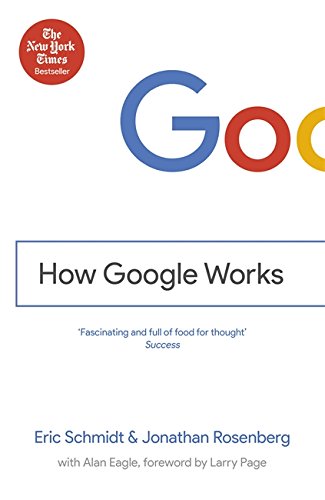Ebook How Google Works, by Eric, Rosenberg, Jonathan Schmidt
Checking out guide How Google Works, By Eric, Rosenberg, Jonathan Schmidt by on-line could be also done quickly every where you are. It appears that waiting the bus on the shelter, waiting the checklist for line up, or other places feasible. This How Google Works, By Eric, Rosenberg, Jonathan Schmidt can accompany you during that time. It will certainly not make you really feel weary. Besides, by doing this will certainly likewise enhance your life top quality.

How Google Works, by Eric, Rosenberg, Jonathan Schmidt

Ebook How Google Works, by Eric, Rosenberg, Jonathan Schmidt
How Google Works, By Eric, Rosenberg, Jonathan Schmidt. Pleased reading! This is exactly what we want to say to you which enjoy reading so much. Exactly what about you that declare that reading are only responsibility? Never ever mind, checking out behavior needs to be started from some certain factors. One of them is checking out by commitment. As just what we want to provide right here, the e-book qualified How Google Works, By Eric, Rosenberg, Jonathan Schmidt is not type of obligated e-book. You can enjoy this publication How Google Works, By Eric, Rosenberg, Jonathan Schmidt to review.
If you desire really obtain the book How Google Works, By Eric, Rosenberg, Jonathan Schmidt to refer now, you need to follow this page consistently. Why? Remember that you need the How Google Works, By Eric, Rosenberg, Jonathan Schmidt source that will provide you appropriate expectation, do not you? By seeing this website, you have begun to make new deal to consistently be up-to-date. It is the first thing you can begin to get all take advantage of being in a web site with this How Google Works, By Eric, Rosenberg, Jonathan Schmidt and also various other collections.
From now, locating the finished website that sells the completed publications will be lots of, however we are the trusted site to check out. How Google Works, By Eric, Rosenberg, Jonathan Schmidt with easy web link, easy download, as well as completed book collections become our good solutions to obtain. You can discover and make use of the perks of selecting this How Google Works, By Eric, Rosenberg, Jonathan Schmidt as everything you do. Life is consistently establishing and also you need some brand-new publication How Google Works, By Eric, Rosenberg, Jonathan Schmidt to be reference always.
If you still require a lot more books How Google Works, By Eric, Rosenberg, Jonathan Schmidt as referrals, visiting browse the title as well as style in this website is offered. You will locate more great deals books How Google Works, By Eric, Rosenberg, Jonathan Schmidt in different self-controls. You could also as soon as feasible to read the book that is already downloaded. Open it as well as save How Google Works, By Eric, Rosenberg, Jonathan Schmidt in your disk or device. It will certainly alleviate you wherever you need guide soft documents to check out. This How Google Works, By Eric, Rosenberg, Jonathan Schmidt soft documents to review can be recommendation for everyone to enhance the skill as well as capability.

Google Executive Chairman and ex-CEO Eric Schmidt and former SVP of Products Jonathan Rosenberg came to Google over a decade ago as proven technology executives. At the time, the company was already well-known for doing things differently, reflecting the visionary--and frequently contrarian--principles of founders Larry Page and Sergey Brin. If Eric and Jonathan were going to succeed, they realized they would have to relearn everything they thought they knew about management and business.
Today, Google is a global icon that regularly pushes the boundaries of innovation in a variety of fields. HOW GOOGLE WORKS is an entertaining, page-turning primer containing lessons that Eric and Jonathan learned as they helped build the company. The authors explain how technology has shifted the balance of power from companies to consumers, and that the only way to succeed in this ever-changing landscape is to create superior products and attract a new breed of multifaceted employees whom Eric and Jonathan dub "smart creatives." Covering topics including corporate culture, strategy, talent, decision-making, communication, innovation, and dealing with disruption, the authors illustrate management maxims ("Consensus requires dissension," "Exile knaves but fight for divas," "Think 10X, not 10%") with numerous insider anecdotes from Google's history, many of which are shared here for the first time.
In an era when everything is speeding up, the best way for businesses to succeed is to attract smart-creative people and give them an environment where they can thrive at scale. HOW GOOGLE WORKS explains how to do just that.
- Sales Rank: #1008048 in Books
- Published on: 2015-03-12
- Original language: English
- Number of items: 3
- Dimensions: 7.76" h x .83" w x 5.08" l, .51 pounds
- Binding: Paperback
Review
"An informative and creatively multilayered Google guidebook from the businessman's perspective."―Kirkus
About the Author
Jonathan Rosenberg joined Google in 2002 and managed the design and development of the company's consumer, advertiser, and partner products, including Search, Ads, Gmail, Android, Apps, and Chrome. He is currently an advisor to Google CEO Larry Page. Eric Schmidt served as Google's CEO from 2001 to 2011. During that time he shepherded the company's growth from a Silicon Valley start-up to a global technology leader that today has over $55 billion in annual revenues and offices in more than 40 countries. Eric is now Google's executive chairman.
Most helpful customer reviews
144 of 149 people found the following review helpful.
Smart, engaging read with useful, immediately applicable insights.
By Don Hutchison
Eric and Jonathan cover a vast territory in their engaging discussion of Google's leadership in our software driven era. While their Google specific comments are singularly informed and compelling, I suspect their most valuable lessons are those applicable to virtually any venture. Many of these are recurring thematics within discussions of modern leadership, but rarely have so many useful concepts been so well and accessibly summarized as in "How." Despite 30 plus years in the business I furiously jotted margin notes throughout the book, reminding myself for instance, of the primacy of purpose, as illustrated by the story of a company, beginning with why it is important that it exists; the defining competitive separation afforded by traction and momentum or, get big fast; speed kills; iteration informs. This is a great read; informative, smart and wise, as reflected by their admiration of John Wooden and his aphorism "it's what you learn after you know it all that counts." For those interested I'll summarize below my 'Top 10' of the books many quality, illustrative elements. There are abundant actionable insights in this book and of course, the occasional tendril of presumption. Overall, my sentiment about the book is summarized by my ordering copies for my sons, nieces and nephews, regardless of the sectors they work within, or majors they are pursuing.
My 'Top 10' of appreciated observations:
1. Crowded work spaces fuel contagious energy and spontaneity; the physical presence of team members matters.
2. Keep management lean, with numerous direct reports per manager to assure leadership is crisp and micro-management rare.
3. Ignorance is not bliss, knowledge is instructive; share virtually everything about the company's business with all employees.
4. Smaller teams for building products; larger to sustain and grow.
5. Deliver transformative products, driven as much or more by insight as evident market demand. PS: platforms with leverage win.
6. Leaders don't delegate hiring; hire smart, curious learners and pay handsomely for impact.
7. Be mindful of your career objectives; sketch the larger ambition, then plan its execution, while remaining smartly opportunistic.
8. Spend 80% of your time on the stuff that generates 80% of your revenues; the new is seductive, but keep your focus balanced.
9. There are only a few truly important messages; assure they are heard: to quote Eric: "repetition doesn't spoil the prayer."
10. It's what you do that counts.
4 of 4 people found the following review helpful.
How Google Works – A Great Human Resource Practices Book
By Don Phin
I read How Google Works on two flights before attending a ThinkHR executive off-site meeting. Good timing! Every manager at your company should read this book. HR included. It contains a wealth of wisdom. It also embodies a significant challenge to employers. It sets forth a "new age" of human resource and management practices. These practices are not for the timid, mediocre or control freak. They are for those that trust smart people and want to be part of creating something special.
While there is a measure of old wine in new bottles, it is the implementation of these practices which is so exciting and challenges us to rethink the role of human resources. Having read the books criticisms I agree the Google approach will not work in every environment. It is young male centric (ping pong and beer anyone?). It’s also easy to say how wonderful you are when you’re at the top. GM was once wonderful and at the top too. Google is rich and can afford to do many things other companies can’t do or don’t want to do. I don’t expect to see McDonalds giving every service employee 20% of their time off to help reinvent the company.
What follows are some the key points gleaned from the book.
The purposeful use of languaging. Right out of the gate Google cofounder and CEO Larry Page describes the culture of Google. The following phrases are used in the forward and throughout the book "autonomy of thought", "moonshot thinking", "incrementalism leads to irrelevance over time", “focus on the user” Page recognizes the importance of defining a culture. To what degree can you help leadership in delivering the message?
Keep a spreadsheet ranking the company’s top projects. Google did this for years with its top 100 projects. What are the top dozen projects in human resources and how are they ranked? Are they in alignment with the company’s list?
Don't live by schedules. This is in alignment with the TQM ideas of Dr. Edwards Deming who said you manufacture towards perfection not towards a tolerance. Likewise when you put a deadline or date on something you manage the project towards it. Google realized it had to loosen the reins and allow its engineers the freedom to move fast. Not according to any deadline. And yes, we have to schedule meetings and the like. This is a conceptual point being made.
Product excellence is now paramount to business success. Not the control of information, not a stranglehold on distribution, not overwhelming marketing power (although these are still important). This is largely because of better informed consumers. For the consumer this is a good thing. The same concept applies to managing the workplace. Employees are better informed than ever too. Top employees can insist on management excellence…or work someplace else.
The primary objective of business is to increase the speed of product development and quality of its output. The only way to do that is to attract and hire what Google calls "smart creatives". Here's a list of smart creative characteristics: technical knowledge, hands-on experience, an expert in doing, analytically smart, business smart, competitive smart, user smart, new ideas smart, seriously creative, risky creative, self-directed creative, open creative, thorough creative, communicative creative. No smart creative has all these characteristics. These are the type of employees that can get a job anywhere. It is not about finding them but rather attracting them.
Hiring is the most important thing a leader does. This does not differ from what Peter Drucker, Jim Collins and every other management expert has told us. Problem is half of the companies choose to execute on it better than the other half. To be effective, there has to be a culture of execution when it comes to great HR practices. Is it more important your mangers hire fast or hire right?
Employees at Google have the freedom to solve any big problem that stands in the way of success. Google's culture turns their engineers into problem-solving ninjas.
Diversity. Google's approach is simple: "it doesn't matter who you are, just what you do". There are critics of Google who claim this diversity doesn’t exist.
The rule of seven. This is an interesting conversation. It's hard to manage 27 employees. Many experts, including me, have recommended a limit on direct reports. Google does just the opposite. They feel that if somebody has too many reports then they won't have the ability to micromanage them. We must test to find out what approach works best in our environment.
"Your title makes you a manager. Your people make you a leader" Debbie Biondolillo, Apples former head of HR
Overworked in a good way. Every company is rightfully concerned about the excessive stress placed on its workforce. Google believes that highly engaged employees stress only about their desire for accomplishment and little else. Not everybody agrees. Many a working parent has commented on the brutal reality of this overworked approach (put the kids to sleep and check in for the next three hours).
A culture of "yes" – as opposed to a culture of "no". HR, who has been painted squarely in the corner of no, needs to communicate yesses better. Let leaders and workers know the yes agenda (you have one…right?). Create skunkworks, experiments, tests, etc. so you can fail quickly and find out what works. This can be a real challenge for HR executives as their personality profiles reveal a personality geared towards rules and conformity, not experimentation. They're very concerned about any judgment that may come with mistakes made. Not exactly an innovators profile. Time to get over it.
Have fun, at your own expense. A good sense of humor can keep people humble. Google gives example after example of how they poke fun at themselves.
Open, open, open. While Google has its critics about openness on the outside, it is determined to create an open culture internally. Google believes openness is the only way to deal with a rapidly changing, chaotic business environment. Yes it can get sloppy but falling behind the times due to stagnation at ever accelerated rates is not an option. "With openness, you trade control for scale and innovation."
"You must wear something". Eric Schmidt's answer to the question of what the Google dress code was.
"Don't be evil" Another mantra at Google. While few would profess a desire otherwise, at many companies it is not a mantra attached to a commitment. Enron being the classic example. Highly productive managers, with good numbers, can get away with brutish tactics at many a company. The don't be evil mantra can avoid many lawsuits, agency investigations, media problems and employee turnover.
"Giving the customer what he wants is less important than giving him what he doesn't yet know he wants". Such as an amazing HR experience. Maybe HR must give CEOs what they didn’t know they wanted: a kick ass HR department. Curious-if you could create an X prize for human resources what problem would you try to solve?
"If you focus on your competition, you'll never deliver anything truly innovative” This is true for your HR practices too. Yes it's fine to learn from other company experiences. It is even better to generate your own. To be a great observer of your own environment, condition and opportunities.
"It didn't matter if the person would be an entry – level software engineer or a senior executive; Google made it a priority to invest the time and energy to ensure they got the best possible people". One would think this level of commitment to excellence would be common but it is not. Google believes the higher you go in the organization, the more attached executives should be to the hiring process Google also believes that hiring should be peer – based, not hierarchical, with decisions made by committees.
"The objective is to create a hiring culture that resists the siren song of compromise.”- A song that only gets louder amidst the chaotic whirlwind of hyper growth.
Hire "learning animals" or people with a growth mindset. When you do, offer training and growth opportunities. Problem is most people do not have a personal learning culture. Perhaps one out of ten do… at best. One reason there is no substitute for required learning, as most won't do it voluntarily.
Interview questions:
• Reflect on a past mistake you made. What did you learn from it?
• What books are you reading right now?
• Take them through problematic case scenarios
• "Could you teach me something complicated I don't know". A favorite interview question by Sergey
Identify candidates who asked thoughtful questions
Conduct 30 minute interviews and limit yourself to four. My feedback is why do they impose an artificial limit if their mantra is to not live by schedules? I say take the time you need to make a great hire.
Create a hiring packet for executives including a one page summary with all the key facts and supporting material. There is no substitute for a well prepared hiring system.
There is always an "up" opportunity available at Google. It amazes me when people must leave organizations to grow. What a waste of human capital investment
Test yourself: “if you could trade the bottom 10% of your team for new hires, would your organization improve?”
Another test: “are there members of your team whom, if they told you they were leaving, you would not fight hard to keep? If there are employees you would let go, then perhaps you should.”
The first step in the decision-making process is to understand the data. The next step is to engage in an open dialogue where opinions and objections are welcome. There's a bias for action and a decision must be made and that is the ultimate responsibility of the executive.
Google believes in daily executive team meetings. Short meetings that are action oriented. My only feedback is to make sure that is what happens. Why the meeting, how long, what outcomes, get it done.
Many chapters of the book focused on communication and decision-making. I saw nothing I would label as new. The principles for communication and wise decision-making have been with us for thousands of years and half of executive teams apply them better than the other half. Seems like Google does a good job of it.
Have a playbook. Google challenges its business leaders to have a playbook with notes on how to communicate to employees, bosses, directors, customers, etc. For example, a playbook for one on one meetings, or to discuss performance, manage relationship with peer groups, innovation/best practices, etc. Again, a bit of old wine in new bottles. Playbooks, scripts and SOPs have been around for years.
Innovation. The end of the book is spent on this subject, something near and dear to the DNA of Google. But it should also be near and dear to the DNA of every company and career. According to Google innovation "entails both the production and implementation of novel and useful ideas". It also requires much optimism. If you want to be innovative you have to "think big". This means you set goals that are almost and often unattainable.
20% time. Allows its engineers and presumably others time to experiment, test, identify novel projects and find others interested in supporting them. How do you catch up for the company that gives its engineers that level of freedom? Odds are you don't.
Conclusion
I regularly speak to company CEOs. They continue to state their greatest business concerns center on the ability to hire talent, get them to produce, keep them engaged, and retain the star performers. While this book is a self-serving manifesto, How Google Works provides a formula how to do each of these critical business objectives in a great way. It is as insightful as any human resource book you'll ever read. A strategic HR executive would well embrace the Google approach.
3 of 3 people found the following review helpful.
A worthwhile book that complements well with other readings
By Weihan
Insiders' view on Google's principles and philosophies. The numerous well told anecdotes and stories are a valuable source for business-school case studies and provide important lessons for aspiring leaders.The authors also elaborated their insightful views on innovation, strategies, culture, and all, throughout the book. This a fun and worthwhile book to read.
However, there are not as sufficient high-level frameworks or theoretical foundations as I would hope to see, that help explain the reasons Google does things in certain ways. In other words, the book presented well the How but not so much the Why. Although diligent readers can for certain extract high-order reasoning from the concrete principles and stories in the book, it would be helpful if the authors could guide readers more explicitly into high-level thinking. For this reason I gave the book a 4-star.
There are quite a few books on the more theoretical side that complement this one well (on innovation, strategy, social psychology, and so on). This book would be a valuable addition to the essential reading list for a business person.
See all 386 customer reviews...
How Google Works, by Eric, Rosenberg, Jonathan Schmidt PDF
How Google Works, by Eric, Rosenberg, Jonathan Schmidt EPub
How Google Works, by Eric, Rosenberg, Jonathan Schmidt Doc
How Google Works, by Eric, Rosenberg, Jonathan Schmidt iBooks
How Google Works, by Eric, Rosenberg, Jonathan Schmidt rtf
How Google Works, by Eric, Rosenberg, Jonathan Schmidt Mobipocket
How Google Works, by Eric, Rosenberg, Jonathan Schmidt Kindle
How Google Works, by Eric, Rosenberg, Jonathan Schmidt PDF
How Google Works, by Eric, Rosenberg, Jonathan Schmidt PDF
How Google Works, by Eric, Rosenberg, Jonathan Schmidt PDF
How Google Works, by Eric, Rosenberg, Jonathan Schmidt PDF

















